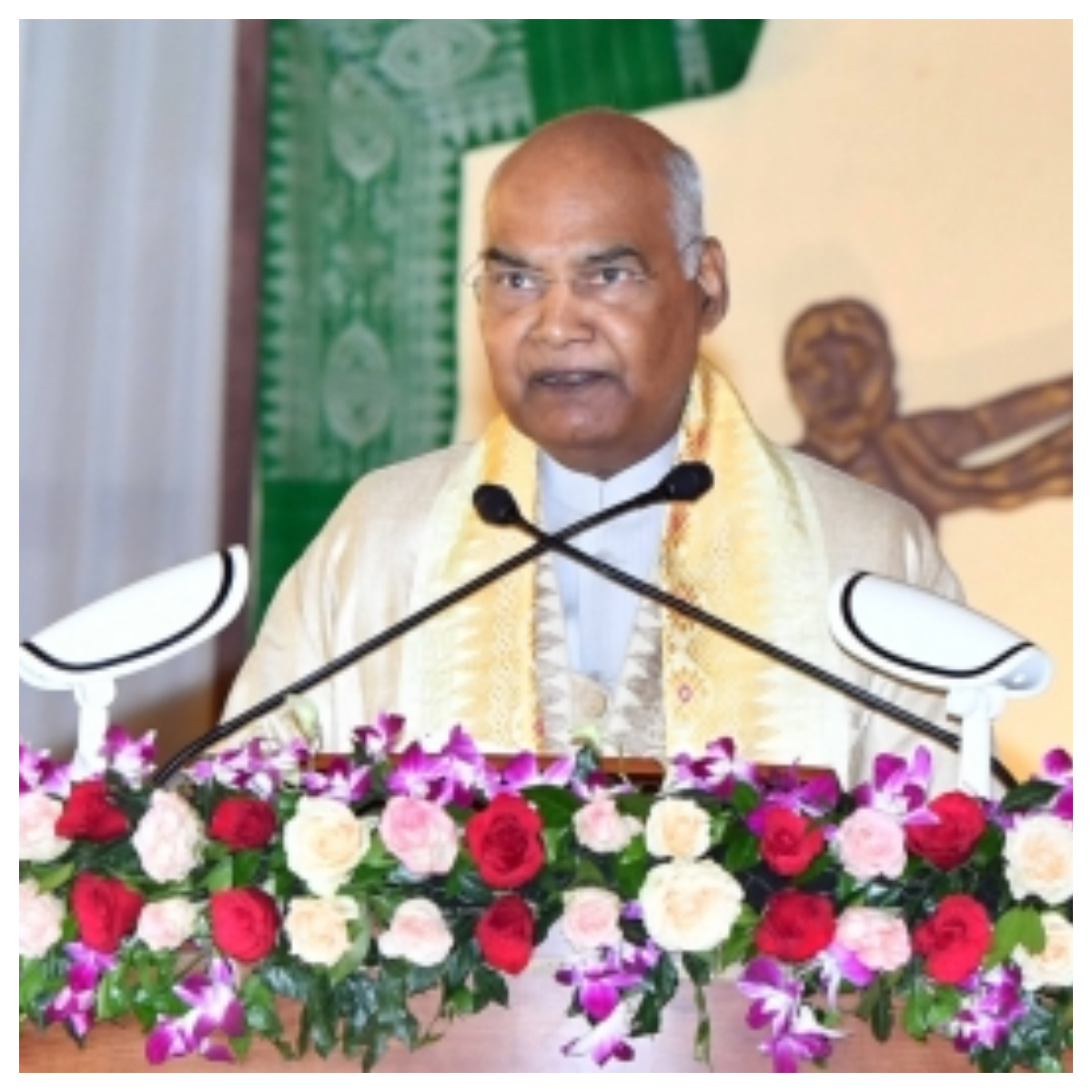National
Promotion of local languages responsibility of society and government: Kovind

President Ram Nath Kovind on Wednesday said that promotion of local languages is the responsibility of the society and the government while the National Education Policy-2020 has also emphasised on the promotion of the local language.
Addressing the valedictory function of the 61st annual conference of the Bodo Sahitya Sabha (BSS), a regional language literary meet, in western Assam’s Tamulpur, the President said that the BSS significantly contributed for the past 70 years in strengthening the Bodo language, literature and culture. Noting that so far 17 writers have been awarded Sahitya Akademi Awards for their works in Bodo language, Kovind said that out of that, 10 have been awarded for poetry work and this shows the natural inclination towards poetry among Bodo writers.
“Many women are writing in different genres of Bodo literature. But it has also been observed that only two women are among senior writers who have received the Sahitya Akademi Award for original work,” he said, urging the BSS to encourage women writers. The President said that to keep any literature alive and relevant, the participation of the younger generation is very important. Therefore, special encouragement should also be given to young writers by BSS.
Saying that literature and languages united people, he expressed his happiness that the works in other languages are being translated into the Bodo language with great enthusiasm. Kovind expressed confidence that such translated literature would give an opportunity to the readers of Bodo language to get acquainted with other Indian languages as well as world literature. The President appealed to the Assam Government to make efforts to promote the Bodo language.
Kovind told the gathering that he has been familiar with the Bodo language since he was a member of the Rajya Sabha. He said that the Bodo language was incorporated in the eighth schedule of the Constitution when Atal Bihari Vajpayee was the Prime Minister. The President said that the founder-president of the BSS, Joy Bhadra Hagzer and General Secretary Sonaram Thosen had made commendable efforts in recognition of Bodo language. This Sabha has also played an important role in the use of Bodo language as the medium of school education and place in higher education, he added.
Kovind is the first President who attended and addressed the BSS meet.
The three-day conference of BSS began on Monday and several thousand delegates attended the meet from across the country and abroad. Apart from Assam, a large number of people speaking the Bodo language live in Bangladesh, Nepal, Tripura, Nagaland, Arunachal Pradesh, Sikkim and West Bengal.
Inspired by the Assam Sahitya Sabha, the BSS was formed in 1952 for the development of literature, culture, and language. The Bodos (or Boros) were once a powerful and dominant race in the northeast. The Assam government recognised the Bodo language as an associate official language of the state in 2020 after the signing of the Bodo peace accord between the Centre, Assam government and four Bodo militant outfits in January 2020. Assam Governor Prof. Jagdish Mukhi, Chief Minister Himanta Biswa Sarma, his Meghalaya and Sikkim counterparts Conrad K. Sangma and Prem Singh Tamang respectively and dignitaries from Bangladesh and Nepal attended the mega event of the BSS.
Crime
Two Held With ₹68 Lakh Cash Near India-Myanmar Border In Mizoram; Heroin Worth ₹78 Lakh Seized

Aizawl: Two persons were arrested with Rs 68 lakh in cash near the India-Myanmar border in east Mizoram’s Champhai district, officials said on Thursday.
Acting on a tip-off, the Assam Rifles intercepted a vehicle at Zote village on August 11, they said.
Upon thorough checking, Rs 60 lakh in cash was recovered from two persons in the vehicle.
The duo, identified as Joseph Lalthansanga and Vanlalruati, could not state any proper reason why they were carrying such a huge amount of cash. They were subsequently handed over to the police for legal action, officials said.
In another operation, the Assam Rifles recovered 94.6 gram of heroin, worth Rs 78 lakh, from the village on Wednesday.
The drugs were handed over to the Excise and Narcotics Department, officials said.
National
India’s AI Tech Spending Projected To Reach Rs. 92 Thousand Crore By 2028: Report

India’s AI technology spending is projected to grow at an annualised rate of 38 per cent from 2023 to reach $10.4 billion (approximately Rs. 92 thousand crore) in 2028, a report said on Thursday.
Around 40 per cent of organisations in India have already implemented agentic AI, and close to 50 per cent are planning to use the technology within the next 12 months, IDC InfoBrief and UiPath said in a joint report.
In 2025, AI investments are focused on building the foundational infrastructure required to power transformative, high-value use cases.
According to the report, the adoption is surging, fueled by a tech-savvy workforce, expanding digital infrastructure, and government-backed initiatives.
Organisations’ spending on enterprise automation, multilingual AI models, and agentic deployments is driving this momentum further.
The benefits are already visible, as 80 per cent of Indian companies say agentic AI boosts productivity, while 73 per cent say it improves decision-making, the report said.
According to the report, agentic AI is gaining strong traction across the manufacturing, retail and wholesale, healthcare, and life sciences industries, which heavily rely on data and repetitive decision-making cycles.
“Agentic automation is rapidly redefining business operations across India. While enterprises in this region are embracing the full potential of AI agents to streamline workflows and autonomously execute complex business processes, trust and security remain barriers to widespread implementation,” said DebDeep Sengupta, Area Vice President, South Asia, UiPath.
Our agentic automation platform directly addresses these challenges, breaking down barriers to enterprise AI adoption by enhancing security and compliance, improving accuracy and reliability for agentic outcomes, Sengupta added.
About 69 per cent of Indian organisations are using agentic AI to enhance productivity, 59 per cent to drive personalised customer engagement, while 57 per cent apply it to risk and fraud detection, highlighting how agentic AI is being applied across front and back-office functions, the report highlighted.
“Becoming an AI-fueled business is no longer an option in today’s unpredictable climate. For many organisations, it’s fast becoming a strategic necessity,” said Deepika Giri, Associate Vice President, IDC Asia/Pacific.
Across the region, organisations are embracing agentic AI and agentic automation at scale, Giri added.
National
Govt to amend MCOCA to contain smuggling of narcotics: CM Fadnavis

Mumbai, July 2: Chief Minister Devendra Fadnavis on Wednesday told the state council that the state government will move an amendment during the ongoing monsoon session to the Maharashtra Control of Organised Crime Act (MCOCA) to take action against the smuggling of narcotics to deal with the cases in which the accused arrested under the Narcotic Drugs and Psychotropic Substances (NDPS) Act, 1985 received bail.
In his reply to a question by BJP legislator Parinay Fuke, the Chief Minister said that a separate NDPS unit has been set up in every police station in the state and officers and other personnel have been appointed in it. Coordination committees have also been set up at the district level. He added that the police have taken action in a large number of cases in the last two and a half years.
Fadnavis said that with the help of the Central Government, the state-level and inter-state coordination has now become more effective. He also said that intelligence sharing is going on with all the states, and due to this, joint action against smugglers has been possible.
The Chief Minister also said that addiction recovery centres are important and that appropriate policies will be formulated to increase their number and quality, and quality addiction recovery centres will be established. Clarifying that cannabis cultivation is banned and is not legal in Madhya Pradesh, he said that strict action will be taken against anyone smuggling cannabis, gutkha or similar substances.
Meanwhile, CM Fadnavis in his reply to another question raised by Shiv Sena UBT legislator Sunil Shinde said that all cases related to compassionate recruitment of police officers will be resolved on a mission mode in the 150-day plan of the state government. At the same time, orders have been given to all departments regarding compassionate recruitment.
Fadnavis said that the concept of 8-hour duty was first implemented in Mumbai itself. Sometimes there are exceptions during festivals, but overall, the 8-hour duty of the police has now become stable. Also, weekly holidays have been started across the state for the police, and if, for some reason, they do not get the leave, their ‘encashment’ has also been increased on a large scale. Earlier, the amount of this encashment was less, but now it has been increased, he added.
Large-scale housing projects for the police are being implemented across the state, including Mumbai. Work is also going on at a rapid pace at the taluka level. He mentioned that the work of the Police Housing Construction Corporation is unprecedented. Referring to the DG Loan Scheme, CM Fadnavis said that this scheme was started, but it was closed during the previous government. Now the scheme has been restarted, and efforts are being made to clear the backlog.
Addressing the increasing incidence of lifestyle-related diseases among the police, health check-ups have been made mandatory once a year for police officers above the age of 40 and twice a year for police officers above the age of 50. The Chief Minister said that a special scheme of counselling and interaction with senior officers is being implemented for the mental health of the police.
State’s home minister Yogesh Kadam said that the government is implementing many measures for the welfare of the police, in which free treatment is being provided for 40 types of diseases. For this, tie-ups have been made with 270 hospitals in the state. Cancer screening camps have been organised with various hospitals, and Yoga, meditation and gymnasium have been started for the police.
-

 Crime3 years ago
Crime3 years agoClass 10 student jumps to death in Jaipur
-

 Maharashtra1 year ago
Maharashtra1 year agoMumbai Local Train Update: Central Railway’s New Timetable Comes Into Effect; Check Full List Of Revised Timings & Stations
-

 Maharashtra1 year ago
Maharashtra1 year agoMumbai To Go Toll-Free Tonight! Maharashtra Govt Announces Complete Toll Waiver For Light Motor Vehicles At All 5 Entry Points Of City
-

 Maharashtra1 year ago
Maharashtra1 year agoFalse photo of Imtiaz Jaleel’s rally, exposing the fooling conspiracy
-

 National News1 year ago
National News1 year agoMinistry of Railways rolls out Special Drive 4.0 with focus on digitisation, cleanliness, inclusiveness and grievance redressal
-

 Maharashtra1 year ago
Maharashtra1 year agoMaharashtra Elections 2024: Mumbai Metro & BEST Services Extended Till Midnight On Voting Day
-

 National News1 year ago
National News1 year agoJ&K: 4 Jawans Killed, 28 Injured After Bus Carrying BSF Personnel For Poll Duty Falls Into Gorge In Budgam; Terrifying Visuals Surface
-

 Crime1 year ago
Crime1 year agoBaba Siddique Murder: Mumbai Police Unable To Get Lawrence Bishnoi Custody Due To Home Ministry Order, Says Report












